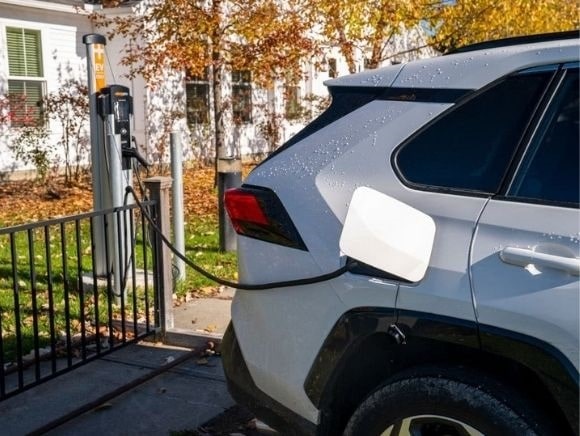President Joe Biden has stated that he wants 50% of the vehicles sold in 2030 to be zero-emission and has signed an executive order to that effect. As part of the plan, he wants all federal cars to be electric (EV). However, the United States is experiencing a harsh winter. What are the risks of depending on EVs in a cold climate?
Shorter Range

(Photo by Robert Nickelsberg/Getty Images)
EVs face many of the same challenges as gasoline cars in cold weather. Cold batteries are more sluggish and take longer to charge. However, their main issue is that they don’t produce much heat, and thus battery capacity must be diverted to heating. During freezing weather, the range of the car will then be significantly reduced. During hot summer days, they face a similar challenge due to air conditioning usage.
Since EVs struggle with acceptable range even during optimal conditions, the added load of climate control can be more than a nuisance. Imagine living in Minnesota and getting stuck in traffic on a freezing January day because of a car accident. You may have to sit for an hour or more to wait for the traffic to clear. If you run low on battery, you must turn off the heating to be able to return home. You probably won’t freeze to death, but it may not be what you imagined it would be like to own an EV.
Grid Failure
If most vehicles become electric, a new daunting challenge arises. Because of long-term reckless policies, the electric grid is already dangerously under-dimensioned in America, leaving little room for demand spikes. Texans got a taste of that in February 2021 when the Lone Star State experienced massive power outages during an icy winter freeze. The grid couldn’t keep up with the demand.
Add electric vehicles on top of that, and you have a crisis of epic proportions in the making. The increased grid load from EVs not only would make power outages more likely but also the blackouts would be more harmful since large swaths of the population would be without transportation.
Grid Cost
 Politicians in Europe, who are further ahead than the United States in the race toward electrification of vehicles, are waking up to the hidden cost of EVs: namely, a dramatic need for increased grid capacity. In the United Kingdom, a new regulation will take effect in June 2022 that cuts off charging during peak hours to avoid blackouts. New chargers will be preset to not charge from 8 a.m. to 11 a.m. and from 4 p.m. to 10 p.m.
Politicians in Europe, who are further ahead than the United States in the race toward electrification of vehicles, are waking up to the hidden cost of EVs: namely, a dramatic need for increased grid capacity. In the United Kingdom, a new regulation will take effect in June 2022 that cuts off charging during peak hours to avoid blackouts. New chargers will be preset to not charge from 8 a.m. to 11 a.m. and from 4 p.m. to 10 p.m.
All installed chargers also will be required to be separately metered to enable heavy EV charging taxation to pay for the enormous cost of upgrading the grid. America will almost surely follow a similar development if Biden’s zero-emission plan is executed.
Plug-in Hybrids
Plug-in hybrids do not suffer the risks or costs associated with EVs. Since they typically are only one-fifth the size of an EV battery, they generate only one-fifth of the grid load. Conveniently, they also work during blackouts. However, even if Biden’s plan includes accommodations for plug-in hybrids, the decision to switch the entire federal fleet to EVs signals that plug-ins will not be prioritized. As it stands, his plan will mean galloping grid cost, dependency on batteries made in China, and increased risk of blackouts.
~ Read more from Caroline Adana.



